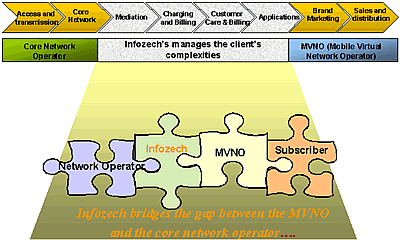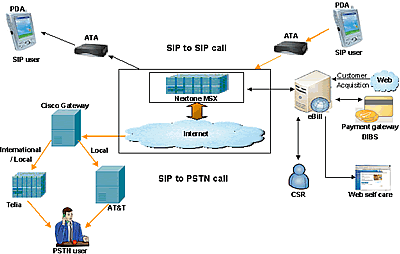Convergent bill for European MVNO
The customer is a company providing cutting-edge technology in the communications marketplace. A mobile services specialist, the company has been leading the industry in delivering the latest and most exciting mobile content.
Positioning itself as a Pan Nordic and Pan European MVNO, it is a young and innovative service provider, focused on the mobile space. The organization, which has commenced operations in the Nordics, will later spread its wings to other regions in Europe and North America. Its solutions cover a gamut of customers—from large enterprises at one end, to SOHO (Small Office Home Office) companies and even individual users.
The business opportunity
The VoIP market scenario in Denmark
Located in Northern Europe, Denmark has an advanced broadband infrastructure and one of the highest levels of broadband penetration services in Europe. Almost 69 percent of the Danish population accesses the Internet, with 84 percent connecting from home. Around 22 percent of households are using broadband while the total mobile subscriber penetration in Denmark has reached 60 percent. The increased usage of mobile services in the Scandinavian region has led to a continuous upward trend of rising ARPU. The ARPU in Norway rose from 297 kroner in the first quarter of 2005 to 305 kroner in 2006, and has risen from 229 kroner in 2005 to 250 kroner in 2006, in Denmark.
The requirement
The client, being an emerging MVNO, decided to tap into the business opportunity created by VoIP in the Scandinavian region, by paying due diligence to the following needs:
- Innovative product packaging: The client devised a well-differentiated and attractive value proposition to increase customer acquisition. The MVNO created compelling promotional schemes like offering free international air tickets to early subscribers and free international calling for the first 30 days, etc.
- Faster time to market: It adopted suitable practices enabling faster time-to-market of new and innovative VAS as well as VoIP services.
- Reduction in CAPEX and OPEX: In order to cut down its CAPEX and OPEX investment, the client managed its global operation through a single centralized location.
- Converged billing: The customer offered a single bill, single top-up and single point of interface for the complete suite of services to subscribers
- Localized support: Since the client wanted to launch its operations in Denmark to begin with and eventually spread its presence across the Scandinavian region, it needed a solution that would manage all its global operations from a single centralized location. It required a solution that supported localization of languages and could provide multilingual support.
- Web self care: To be able to remotely administer its multi-nation deployment, a Web self-care option was a critical requirement for the MVNO.
The service provider wanted to provide mobile as well as VAS services to its end customers, and give them the flexibility of being “SIP only” subscribers. In this situation, they did not even need to own a mobile phone. A SIP customer would require an ATA device, using which calls could be made even from the desktop, in addition to the PDA. It wanted a solution that could serve a variety of subscribers including the following:
- SIP only customers
- SIP + Mobile customers
- Only Mobile customers
To create this environment, setup, the client needed to deploy a billing server, a soft switch and a PSTN gateway. The idea was to partner with a solutions provider that could deliver a solution that scaled from one to thousands of users, an offering that could be moulded to the needs of virtually every market segment.
To achieve these objectives, it was on the look out for a tailor-made, and revolutionary solution that would allow it to achieve convergence in terms of merging IP telephony with mobile telephony. Infozech's solutions team understood the client's requirements well and put together a solution that met its objectives of becoming a successful MVNO.
The solution

Fig 1. Infozech bridging the gap
Infozech provided a convergent billing and customer care solution supporting both prepaid and postpaid scenarios. The solution supported all the three types of customers, such as “SIP only,” “SIP+mobile” and “Mobile only.” The subscriber, therefore, could either originate the call from the PSTN phone or a SIP phone. The call originating from the PSTN phone would get terminated at the Cisco PSTN gateway, while the call originating from the SIP phone would get terminated at the soft switch. Calls originating on the IP network to the PSTN destinations could be routed via carriers Telia and AT&T. The preferred carrier for local calls was AT&T, while Telia allowed both local as well as international calls to be routed.

Fig 2. Solution architecture
Infozech provided the client with the following capabilities as part of its converged MVNO solution:
- The solution allowed the client to apply discounts on multiple levels of customer hierarchy for postpaid customers. With this feature, customers could enjoy discounts on individual services or on groups of services.
- The system also offered commissions to the hierarchy of customers, which were applicable at the account level. For example, in the case of corporate customers, the departments and individual employees of each department could be allocated unique commissions.
- The existing postpaid customers were allowed to subscribe to new lines on the account number and the services of the different lines could also be different.
- Using the functionality of hot billing, subscriber calls could be rated in real time, thus enabling call control and revenue assurance.
- The system supported taxation at the base rates i.e. on Monthly Recurring Charges (MRC). Thus, taxes like VAT, etc. were provisioned to be charged to customers.
- A detailed and comprehensive online interface allowed SIP customers to view their account information, existing and past invoices and call details and allowed them to modify/update their personal details.
- The details of all customers (SIP as well as mobile customers) were maintained in the eBill database and could be accessed by the softswitch in case of the SIP calls.
- The CSRs could print multiple invoices at the same time. They could render the erroneous invoices invalid and void them. After correction of the errors, system allows regeneration of such invoices.
- Number porting was supported, which allowed customers to retain their number even if they changed their carrier.
- The system allowed the client to integrate with multiple third parties like the Logistics department, Telia (carrier) for number provisioning, the payment gateway DIBS, Cisco's PSTN gateway, softswitch etc.
The benefits
- Enabled global expansion
The system supported multiple currencies like Danish and Swedish on the DIBS payment gateway, in view of the multi-nation deployment of the customer. The solution's interface also provided English, Danish and Swedish support, thus enabling the client to roll out its services across boundaries.
- Reduction in the CAPEX investment
Infozech provided the client with 24*7*365 best of breed support services. Support was made available to the client in various forms such as remote support, online support, multilingual support, Web-based access etc. Access to such round the clock and flexible support options enabled the client to save significantly on traveling, accommodation and other sundry expenses, thereby significantly reducing its CAPEX.
- Competitive advantage
Infozech's long-term partnership approach gave the client an advantage over its competing vendors that were focused on a “sell and get out” culture. The Infozech solution was flexible and robust enough to be able to support the ever-changing services and innovative product packaging needs of the MVNO client.
- Reduction in total cost of ownership (TCO)
The solution enabled the emerging MVNO to cut down its costs by agreeing on commercial terms not available in the market. It offered flexibility in terms of how to structure the deal, by offering both: the revenue share and direct buy out models to the client. Thus the client was able to reduce its total cost of ownership by following separate and appropriate business models for different needs.
- Faster time to market
The MVNO required an offering that had to be deployed within serious time constraints, while keeping costs under control and Infozech had the capability to deliver such a product.
- Increase in productivity
The solution deployed was fully automated and thus the entire operation could be easily managed by a small team. The system had predefined automatic processes and procedures requiring minimum manual intervention, leading to an increase in productivity and efficiency of operations.
|

